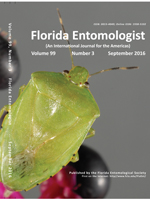We report the discovery of Aulacaspis yasumatsui Takagi (Hemiptera: Diaspididae) in Chiapas State near the Guatemala—Mexico border. This cycad pest presents a potentially serious threat to the many cycads species native to Mexico.
Aulacaspis yasumatsui Takagi (Hemiptera: Diaspididae; Fig. 1a and b), known as cycad aulacaspis scale, is a species of armored scales native to Southeast Asia (Howard et al. 1999; Muniappan & Viraktamath 2006) and has a host preference for cycads (Takagi 1977). Cycad aulacaspis scale has been spreading rapidly worldwide, and in heavy infestations can kill the plants (e.g., Cycas revoluta Thunberg [Cycadaceae]; Howard et al. 1999).
Cycad aulacaspis scale infests not only ornamental cycads but also native species (Emshousen et al. 2004). In the New World, A. yasumatsui is established in the United States, Costa Rica, Barbados, Cayman Islands, Guadeloupe, Martinique, Puerto Rico, and U.S. Virgin Islands (Howard et al. 1999; CABI 2015). Short distance dispersal occurs by wind or by “hitch-hiking” (phoresy) on mammals, birds, or large insects (Heu et al. 2003), but the nearly worldwide distribution is due to the transport of infested plant products.
From Oct to Dec of 2015, we collected specimens at 7 locations in the city of Tapachula and 2 locations in Playa Linda, Chiapas State, near the Mexico-Guatemala border. Female specimens were slide mounted following Williams & Granara de Willink (1992) and identified using published taxonomic keys (Suh & Ji 2009; Takagi & De Faveri 2009; Nesamari et al. 2015). Samples were identified initially at El Colegio de la Frontera Sur (ECOSUR) and subsequently verified by the National Centre of Phytosanitary Reference (SENASICA; Certificate 83631). Cycad aulacaspis scale was found on 2 species of ornamental cycads, namely, Cycas circinalis L. (1 plant specimen; Fig. 2a) and C. revoluta (8 plant specimens; Fig. 2b) in Mexico.
Mexico is second worldwide in cycad diversity (42 species in 3 genera), and more than 80% of these species are endemic (Vovides 2000). Cycad aulacaspis scale prefers hosts in the genus Cycas, which is native to Asia, and it was first reported in the United States in Miami, Florida, infesting ornamental King Sago (C. revoluta). In addition, 6 species of the genus Dioon (Zamiaceae) native to Mexico are recorded hosts (Howard et al. 1999). Cycad aulacaspis scale may present a serious threat to the family Cycadaceae in Mexico; in Guam, A. yasumatsui is killing native species (C. micronesica Hill) at an alarming rate (Haynes & Marler 2005).
Figs. 1 and 2.
Aulacaspis yasumatsui. 1a. Scanning electron microscope image of dorsum of immature; scale bar 27.7 μm. 1b. Slide-mounted adult female: pygidium (black arrow) and spiracles (white arrow); scale bar 100 μm. 2a. Colonization on Cycas circinalis at urban area in Tapachula, Chiapas, Mexico. 2b. Infested leaf of Cycas revoluta at Playa Linda, Chiapas, Mexico.

In southern Florida, optimal temperature for A. yasumatsui female development is 30 °C (Cave et al. 2009), which is similar to the temperatures of the coastal plain of southern Mexico (Sánchez & Jarquín 2008; INEGI 2013). The temperature and availability of hosts near the southern Mexican border could promote its successful establishment in this zone, spreading later to other areas with similar climate. For that reason, early detection and eradication through adequate management (e.g., cultural practices, chemical or biological control) of this invasive pest is paramount in a global center of biodiversity of cycads such as Mexico. In addition, regulation and inspection of ornamental cycads imported to Mexico are essential to prevent introduction of infested cycads. Furthermore, we recommend an educational campaign for the various sectors involved in this issue to avert the spread of this invasive pest in Mexico.
We thank G. Nieto for scanning electron microscope images and Ian Stocks for providing detailed and very helpful comments on a previous version of this scientific note. This study was partially supported by CONACYT (Consejo Nacional de Ciencia y Tecnología) scholarships to F. B. R.-G and A. G.-G.





